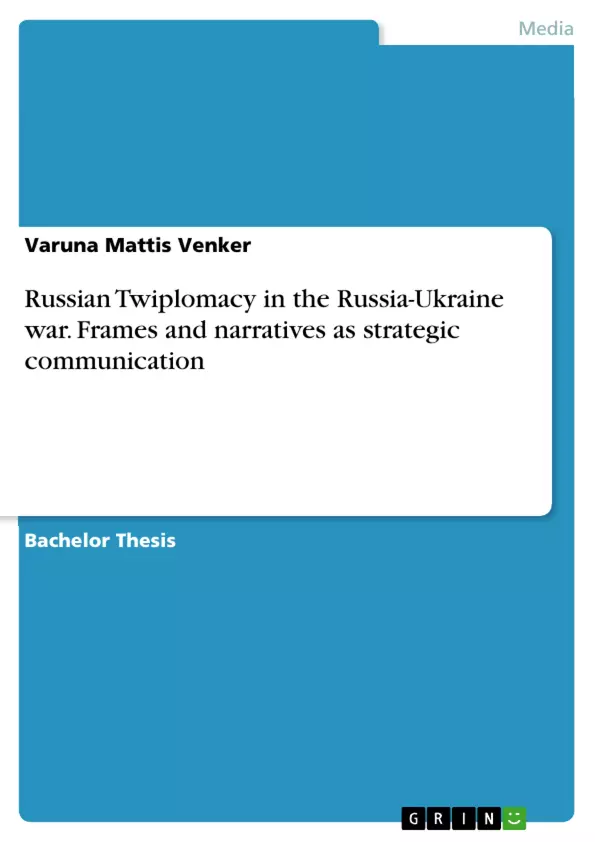Presented here is a comprehensive analysis of the Russian Twitter strategy in the Russia-Ukraine war, based on sampling and from the perspective of framing theories. This bachelor thesis documents the analysis of Russia's Twiplomacy in the Russia-Ukraine war concerning the framing approach. For this purpose, the posts of a selection of seven Russian government profiles on Twitter are examined over a period of five months. Examining Russian Twiplomacy provides a deeper understanding of its function. This study contributes to our understanding of the use of social media as a tool for strategic communication. The concrete implementation of the Russian strategy and the adjustments to the changing situation should be evident from the study material. The analysis of frames offers the possibility of recognizing the intention of the communicators. That offers opportunities to counteract influence and to identify communication goals for further clarification and negotiation.
Inhaltsverzeichnis (Table of Contents)
- 1. Introduction
- 2. Research questions
- 3. Theory
- 3.1. Twiplomacy & strategic communication
- 3.2. Framing-Approach
- 3.2.1. Different framing techniques
- 3.2.2. Narrative framing
- 4. Current research status
- 5. Methods
- 5.1. Data collection
- 5.2. Data analysis
- 6. Findings
- 7. Conclusion
Zielsetzung und Themenschwerpunkte (Objectives and Key Themes)
This bachelor thesis aims to analyze Russia's Twiplomacy in the context of the Russia-Ukraine war, focusing on the use of framing as a strategic communication tool. The study investigates the Twitter posts of seven selected Russian government profiles over a period of five months to uncover the function of Russian Twiplomacy and its role in shaping public opinion and international discourse.
- Framing as a strategic communication tool in Twiplomacy
- The role of social media in shaping narratives and influencing public opinion
- Analysis of Russian government communication strategies on Twitter
- Understanding the impact of Twiplomacy on international relations
- Identifying opportunities to counter strategic communication efforts and promote dialogue
Zusammenfassung der Kapitel (Chapter Summaries)
The introduction provides context for the study by outlining the escalation of the Russia-Ukraine conflict and the Russian government's communication strategies on Twitter. It introduces the concept of Twiplomacy and framing as crucial elements of digital diplomacy. The thesis sets out to analyze Russian Twiplomacy through the lens of framing, focusing on the identification of specific techniques and their impact on public perception. This study aims to contribute to a deeper understanding of how social media platforms are used as tools for strategic communication and how Russia utilizes these tools to advance its objectives.
Schlüsselwörter (Keywords)
This study focuses on the key concepts of Twiplomacy, strategic communication, framing, narrative framing, Russia-Ukraine war, Twitter, social media, digital diplomacy, and public opinion.
Frequently Asked Questions
What is "Twiplomacy"?
Twiplomacy refers to the use of Twitter by governments and diplomats as a tool for strategic communication and digital diplomacy.
How does Russia use framing in the Ukraine war?
The Russian government uses specific framing techniques to shape narratives, influence international discourse, and advance its strategic goals on social media.
Which Twitter profiles were analyzed in this study?
The bachelor thesis examined a selection of seven Russian government profiles over a period of five months.
What is narrative framing?
It is the practice of embedding information within a story-like structure to make it more persuasive and to guide the audience's interpretation of events.
Can the intention of communicators be recognized through frame analysis?
Yes, analyzing frames allows researchers to identify the underlying communication goals and intentions of the actors involved.
- Citation du texte
- Varuna Mattis Venker (Auteur), 2022, Russian Twiplomacy in the Russia-Ukraine war. Frames and narratives as strategic communication, Munich, GRIN Verlag, https://www.grin.com/document/1274043



